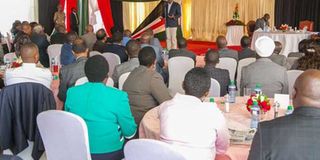UN committed to Kenya’s healthcare

President Uhuru Kenyatta addresses a parliamentary group meeting at State House, Nairobi whose main focus was the Big Four agenda. While the economy might grow marginally, political stability and focused investment in the Big Four agenda will be key in keeping the economy in check. FILE PHOTO | NATION MEDIA GROUP
What you need to know:
- Attaining UHC, or SDG-3 on health, is a substantive human rights agenda that requires sincere collaboration across all parts of society.
UNDAF 2018-2022 is being crafted to align with the government’s recently announced Big Four agenda.
The dialogue organised by Stanford University was about driving the SDGs and, particularly, primary healthcare.
In his article, ‘UNDP’s unholy alliance with Jubilee will derail health project (DN, February 24), Mr Maina Kiai’s account of the exciting dialogue hosted at Stanford University, in the United States, does not present a true account of what transpired at that meeting.
The article has factual errors that should not go unchallenged.
Present at this meeting were former World Food Programme (WFP) executive director Ertharin Cousin, students, professors, Silicon Valley professionals and civil society. Neither the Jubilee Party nor the United Nations Development Programme (UNDP) were mentioned.
First of all, Attaining Universal Health Coverage (UHC), or Sustainable Development Goals (SDG)3 on health, is a substantive human rights agenda that requires sincere collaboration across all parts of society.
HEALTH AND WELLBEING
We are talking about everyone’s health and wellbeing. We will not get distracted by disingenuous headlines in progressing on this journey.
We live in a day and age where we have the expertise, technology and means to advance everyone’s health and wellbeing. It is our moral obligation, as the United Nations and development partners of Kenya, to forge partnerships, find the right modalities to harness the potential out there and make it work for everyone everywhere.
Second, the dialogue organised by Stanford University was about driving the SDGs and, particularly, primary healthcare through collaborative action across all sectors led by the Kenya Government and supported by the UN through its “One-UN” joint UN Development Assistance Framework (UNDAF).
UNDAF 2018-2022 is being crafted to align with the government’s recently announced Big Four agenda.
I was invited to the meeting in my capacity as the UN Resident Coordinator for Kenya and not as the UNDP Resident Representative. Since 2014, when I came to Kenya, I have been a strong advocate for the UHC, particularly maternal and child health.
This open letter by the Frontier Counties Development Council hopefully clarifies and sets things in context about the push by the government and the UN in Kenya to “leave no one behind”.
BIG FOUR AGENDA
Third, UHC, as part of the Big Four agenda, was never presented as the UNDP’s brainchild or project. Based on the discussions that took place, it was stated clearly that the UN country team in Kenya has prioritised the UHC’s alignment to the Big Four agenda in realising health for all. The UN family in Kenya will be “Delivering as One” to support this.
Fourth, Mr Kiai refers to the process as “given its international and foreign focus with little Kenyan participation or ownership” and “turning counties into mere recipients for short-term benefits is one more fabrication”.
I do not understand why he makes this statement. The meeting gave clear elaborations on how the process is to be led by the national and county governments, supported by the UN, with the private sector, philanthropy and civil society partners through engaging in the diagnosis of the contextual challenges and opportunities for transformative action from inception.
MOBILISE RESOURCES
Fifth, “short-term” handouts, as he put it in the article, is a misrepresentation of the facts.
As Kenya goes up the middle-income ladder, development aid will shrink. The government will need to pursue alternative means of financing, beyond the traditional development aid, to sustainably drive socio-economic transformation in the country.
As the UN family, we will do everything possible to mobilise resources to support the government on this front.
Sixth, the discussion on building on lessons learnt from other parts of the world and on addressing corruption and human rights, was omitted in the article.
CORRUPTION CHALLENGES
At the meeting, it was categorically stated that technology is crucial in overcoming the challenges of corruption.
The partnership of the government and the UN to reach the remotest and hard-to-access areas was even featured in Forbes. This is about human rights.
Finally, the reference to Ms Nyokabi Muthama is inaccurate. She is an alumna of Stanford University and was there in her private capacity.
Again, Ms Muthama has every right — like anyone else — to join meetings at the university — or anywhere, for that matter — where she is invited.
Let us all support Kenya in attaining the Big Four agenda, in “Realising Kenya’s Vision to Achieve Universal Health Coverage”, and leave “no one behind”.
Mr Chatterjee is the United Nations Resident Coordinator for Kenya




